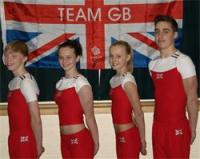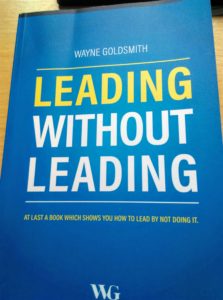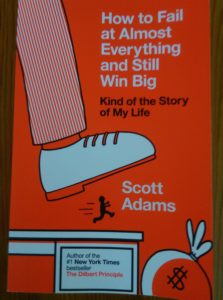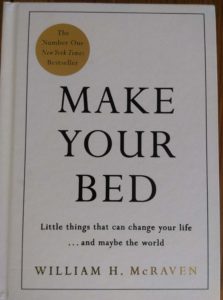Main Menu
Latest Blog Entry
User login
3 Books for your Christmas wish list.
Books for your Christmas wish list
Here are 3 books that may be of interest for you to read. All are well written and include practical advice. A full list of books I have read this year with one line summaries is included at the end.
As usual, please leave your recommendations in the comments section below.
(Read our full list of recommended reading for coaches and teachers)
Leading without leading: Wayne Goldsmith
Practical leadership advice for everyone in your team and club.
Wayne Goldsmith is an experienced swimming coach in Australia. He is also a coach educator and has written this book to help sports leaders apply leadership in real life. Some key points are highlighted here.
The age of the heroic leader is over. How to enable everyone to lead.
- Nothing enforced is sustainable.
- Nothing imposed creates continuous excellence.
- Culture grows from within.
Learn to respect difference. Learn to embrace uniqueness. Learn and grow from watching genius and the atypical.
“Trying to motivate someone else is like teaching a pig to sing: it will frustrate you and annoy the pig.”
A motivator’s real role is to provide the guidance, the systems, the structures, the technical know how, the knowledge, the skills, and the support to help clients, athletes and others to find the discipline and commitment to turn dreams into reality.
(Wayne wrote a guest post years ago for us: “The 10 commandments of great coaching“.
How to Fail at Almost Everything and Still Win Big: Scott Adams
Much common sense advice from the author of Dilbert.
Dilbert ruined my career. After reading the cartoon strip for several years, I developed an incapacity to sit in corporate meetings with a straight face. So much nonsense was being talked, I had to get out.
Adams has written this book which gives examples from his life on where he has failed, but also what he has learnt along the way. This translates into very specific ideas that I found thought provoking and practical.
For example, I have been a big advocate of goal setting in my life. I have been very goal orientated. Adams states that just pursuing goals will lead to unhappiness. Instead, adopt systems that will encourage long term success.
If you set a target goal of “losing 10lb before Christmas”, then you will have one of two outcomes:
- Be unsuccessful until you achieve it, so therefore be unhappy for most of the time.
- Be unsuccessful, so therefore be unhappy.
If you adopt a system of eating breakfast, only drinking 1 alcoholic drink at parties, snacking on the cucumber sticks and eating fruit for dessert, you could sustain that long term and enjoy better health.
Adams finishes with “Get your health right first, acquire resources and skills through hard work, and look for an opportunity that gives you a flexible work schedule someday”.
Highly recommended, wish I had read it 20 years ago (before it was written I know).
Make Your Bed: William H. McRaven
Ten points to help you get through life by this former NAVY SEAL commander.
McRaven gave an address to the University of Texas in 2014. It contained some practical ideas for the students to help guide them through life.
The book title refers to doing something well first thing in the morning. You have started the day by completing a task. McRaven then illustrates each point with a story from when he was on active duty.
He is unafraid of sharing stories about when he was cold, tired and feeling unsuccessful. These things happen to us all. It is how we deal with them that count.
A great stocking filler, even one to share with teenagers who are in danger of being led astray by peers.
Full list of books read so far this year
-
The Mastery Of Movement: Rudolf Laban. Explains the basis for Laban’s work which led to Educational Gymnastics in the UK. Great at learning how to move.
-
Caliban’s War: James S. Corey. Big space opera SF novel. Page turning excitement with decent characterisations
-
Abaddon’s Gate: James S. Corey.Another Expanse SF novel, weaker than the first two.
-
Experiential Learning: David Kolb. Interesting and densely packed text book on lifelong learning. Maybe more relevant today than it was in 1992 when it was written.
-
A Whole Life: Robert Seethaler. Short, but poignant novel about a man living in Austria. Simple, rural existence and the human experience.
-
Cibola Burn: James S. Corey. Return to form in this SF exploration novel.
-
Movement: Physical Education In The Primary Years: Department of Education and Science. 1972 guide for teachers, short, succinct and extremely relevant today. If schools were using this now, children would benefit immensely.
-
Parkour: David Belle. A short book based on an interview of the founder of Parkour. Very insightful.
-
Russell Rules: Bill Russell. Mixture of leadership and basketball related anecdotes. Some very good points made, but slightly over long.
-
The Encyclopedia of Physical Conditioning for Wrestling:John Jesse. Classic text, reread so that I keep a check on whether I have strayed away from the basics.
-
Nemesis Games: James S. Corey Book 5 of The Expanse. The crew of The Rocinate split up. Very good novel.
-
Babylon’s Ashes: James S. Corey. Book 6 of The Expanse. The war escalates and new characters appear.
-
Persepolis Rising: James S. Corey. Book 7 of The Expanse, set 30 years further on and with a turn of events that puts the crew in more danger.
-
The Wasted Generation: George Walton. A look at why so many US men were physically or mentally unfit for the draft in 1965. Great examples and shows concerns have been there for decades.
-
Edward Wilson of the Antarctic: George Seaver. Biography of the doctor, naturalist and explorer who died with Scott. Interesting and inspiring story of this polymath,
-
The Neo-Generalist: K. Mikkelsen & R. Martin. Series of interviews with people who have background in more than one area. Ok for some ideas, but no overall strand, reads like a series of blogs.
-
Post Office: Charles Bukowski. Counter-culture novel of the Beat generation. Very funny.
-
What The CEO Wants You To Know: Ram Charan. Short book, but insightful for bigger businesses. Good summary points at the end to help you focus.
-
Children At The Gate: Edward Wallant. Novel about two young men feeling out of sorts with society. One of only a few by this author, funny and sad.
-
The War Of The World: Niall Ferguson. Extensive history of causes and effects of war in the twentieth century. More geo-political than military account and very revealing. Excellent read.
-
J.R.R. Tolkien A Biography: Humphrey Carpenter. Written soon after his death, this detailed look at Tolkien’s life is interesting and well referenced. Page turner for Hobbit fans like me.
-
Golden Sayings Of Epictetus: Hastings Crossley. Small book from 1917, but full of useful insights from the Stoic philosopher.
-
In Pursuit Of Excellence: Terry Orlick. A very useful, practical and easy to implement book on mental skills training. It has lots of good ideas and is written to be used to by coaches and athletes, recommended.
-
The Boxing Companion: Ed Denzil Batchelor. Very interesting selection of boxing stories and histories compiled in 1964. Looks at the development of prize fighting and glove fighting, plus some fiction.
-
Dr Jekyll and Mr Seek: Anthony O’Neill. Short sequel to the Stevenson classic, easy read, forgettable.
-
The Culture Code: Daniel Coyle. Eminently readable book about how successful teams create a successful culture. Useful points to apply for many organisations.
-
Dreaming in Hindi: Katherine Rich. Autobiographical account of how an American woman went to India to learn Hindi. Interesting details about the struggle to learn a new language as an adult and how culture is so important when learning.
-
Championship Team Building: Jeff Janssen. Very usable book with lots of practical ideas on improving team communication and cohesion. I would say entry level, which is no bad thing.
-
The Great Gatsby: F. Scott Fitzgerald. Classic American novel, elegantly written and poignant.
-
The Village Effect: Susan Pinker. Very readable and relevant look at the importance of human connections. If you have a young person on a screen, or an elderly relative living alone, I would say must read.
-
Greybeard: Brian Aldiss. Classic SF novel about world with no children. Set in and around Oxfordshire.
-
Travels With Charley: John Steinbeck. Well crafted and entertaining autobiographical account of 2 months traveling around the USA in 1968. The man can write.
-
Superhuman: Rowan Hooper. An overview of amazing feats or endeavours such as longevity, memory or endurance running. Interesting, but lightweight. Might trigger an interest into more detailed books.
-
The Junction Boys: Jim Dent. Graphic account of a brutal Texas A&M football training camp in 1954. Too folksy a writing style for me and I was repulsed by the bad coaching by Paul Bryant.
-
On Writing: Stephen King. Read for the second time, and it was even better. King uses an autobiographical account to highlight the process, inspiration and struggle of writing. Excellent.
-
Enlightenment Now:Steven Pinker. Detailed account of how much progress has been made in the last 150 years. In an age of media disillusionment, this book looks at what is good in the world. Evidence based and well researched. Highly recommended.
-
No Hunger In Paradise: Michael Calvin. Excellent report on the state of youth football and academies in England. Very revealing and quite disheartening too. Must read for football families.
-
The Boys In the Boat: Historical and biographical account of college rowers growing up in the Western USA in 1930s. Then going on to compete in the 1936 Olympics. Well written and very interesting.
-
Training Talk: G.Martin Bingisser. Coaching philosophy from 12 coaches. Short, with some good take home messages, especially the last chapter.
-
The Sense Of Style: Steven Pinker. A writer’s guide to clarity, accuracy and fun for the reading public. It is informative, funny and gives great examples. If you write a lot, I would suggest this is essential.
-
Essentialism: Greg McKeowan. A guide to working on what matters most. Useful in parts, with some good examples, especially about the family life.
-
A Pattern Language: C. Alexander, S. Ishikawa, M. Silverstein. A long book about designing and building houses and communities. Daunting at first, but very easy to read. It is well laid out (as it should be) and has many points of interest for the layman like myself. This book has enhanced my understanding of the world.
-
A Cup of Gold: John Steinbeck. Debut novel about the buccaneer Henry Morgan. A ripping yarn.
-
The High Window: Raymond Chandler. Classic detective noir thriller.
-
The Time Machine and Other Stories: H.G. Wells. Early science fiction, very Victorian in style.
-
Danse Macabre: Stephen King. Analysis of horror films and books over a 30 year period up until 1980. Good for the most parts, but could do with an edit.
-
The Long Goodbye: Raymond Chandler. Possibly the best crime novel ever? Superbly written.
-
Playback: Raymond Chandler. Another Marlow novel, still good reading.
-
Catastrophe: Max Hastings. Detailed account of the lead up to World War I and the campaigns until end of 1914. Horrific stories, well described and analysed.
-
The Stolen Baccilus and Other Stories: H.G. Wells. A series of anecdotal horror/ sci-fi stories before both genres were defined. Quite leaden prose, but great ideas.
-
The Platter Story and Others: H.G. Wells. More tales from the mundane background, usually with one twist that makes the reader think.
-
Mastery: Robert Greene. A series of case studies of people from different backgrounds. Tenuous links to make a big book.
-
First and Last Men: Olaf Stapledon. Classic SF book set across billions of years of man’s development. Never read anything like it, very imaginative.
-
Sevens Heaven: Ben Ryan. Account of English rugby coach in Fiji. Interesting story, terribly written.
-
Rules for Radicals: Saul Alinsky. How to create a movement and campaign on issues by a master from the 1960s. Frightening how things have come to pass.
-
New Grub Street: George Gissing. Masterful novel about aspiring writers in London. The poverty and struggle in the 1880s is bought to life with amazing characters.
-
Leading Without Leading: Wayne Goldsmith. Many useful ideas contained within this easy to ready book. Self-published so a few typos and layout is a bit bland. Would be good for starting coaches.
-
A Handful Of Dust: Evelyn Waugh. Unpleasant characters of the idle rich class in the 1920s. The penultimate chapter is the best part, but I disliked the settings.
-
Lions and Shadows: Christopher Isherwood. Humorous autobiographical novel of the literary set in the 1920s.
-
A Brief History of Time: Stephen Hawking. The second, updated edition, well written and very interesting book about meta physics and the Universe we live in.
-
All The Days Were Glorious: Gwyn Neale. A short book about George Gissing visiting North Wales and how it influenced some parts of his novels.
-
Demos: A Story of English Socialism: George Gissing. Interesting novel about one man’s interaction with socialism and its effects on his family and friends. Very strong female characters, quite depressing read, but well written.
-
How to Fail at Almost Everything and Still Succeed: Scott Adams. Useful anecdotes from the Dilbert creator. Clearly written and well laid out, some humour, but surprisingly good practical advice.
-
Make Your Bed: William McRaven. 10 clear points from this former Navy Seal commander. Based on his address to Texas students. Would make good stocking filler.
-
Star Maker: Olaf Stapledon. Visionary SF book that has inspired many other writers. Breadth of ideas is outstanding.
-
Fermat’s Last Theorem: Simon Singh. An account of Andrew Wiles’ solution to the problem. Maths with people.
-
Alexander, The Virtues of War: Steven Pressfield. Easy fiction for bath or beach.
-
Ego Is The Enemy: Ryan Holliday. A series of ideas about humility, well referenced from biographies and personal experiences. Good thinking book.
-
The Odd Women: George Gissing. Novel about several unattached women in the 1890s. Good background on women’s enlightenment and also subjugation.
-
The Big Sleep: Raymond Chandler. Superb novel with excellent writing.
-
The Execution Short Cut: Jeroen de Flander. Clear examples and we’ll organised book on how to execute strategy. The importance of hearts before minds.
-
The Lady in the Lake: Raymond Chandler. Interesting and absorbing novel, one of his best.
-
The Little Sister: Raymond Chandler. Twists and turns galore in this crime novel.
-
Great Expectations: Charles Dickens. How have I not read this classic novel previously? Deep and rich and well characterised. Masterful and enjoyable.
Client Testimonials
 Weston AGC
Weston AGC
I first met James at a South West Gymnastic conference and thought he was superb then, and still do! James' ability to adapt to different sports and levels is excellent, and he is superb at getting his message across to different ages of gymnasts. He did a workshop at our club for our competitive gymnasts and it was superb, His work was of great value to a wide range of ages and levels, with a tremendous emphasis on posture and injury prevention. We have been able to put his training methods into practice and are seeing an improvement in the all round strength and fitness of our gymnasts.
More





Comments
I highly recommend The Barcelona Way – Excellent insights into Barcelona FB club and Pep Guardiola.